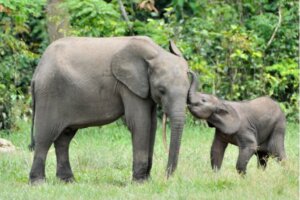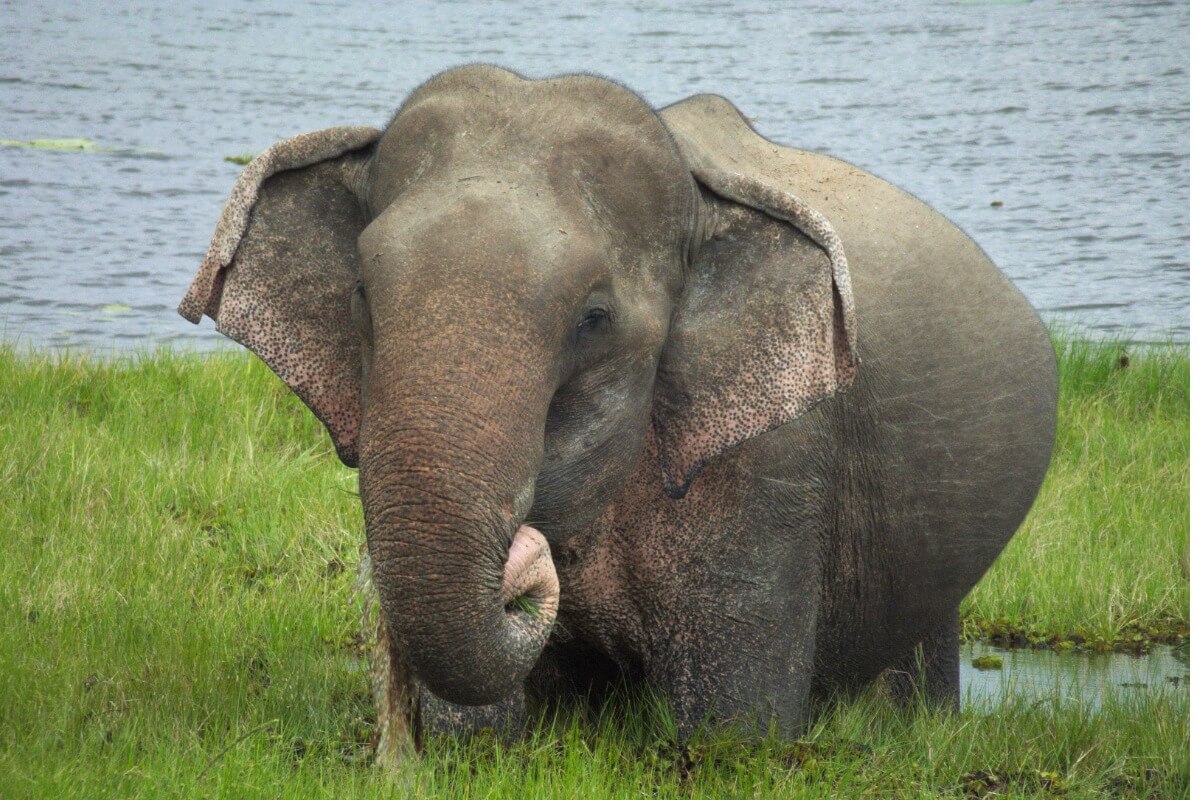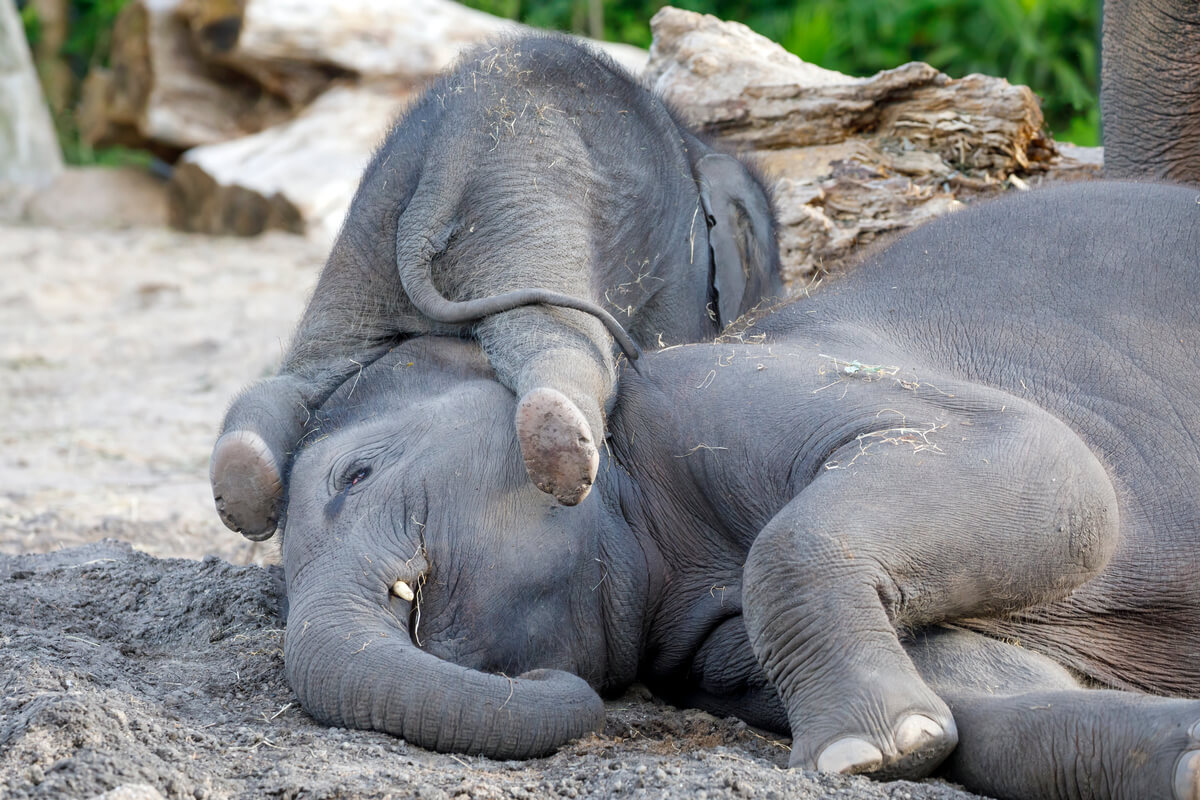Elephant Pregnancy and Reproduction: Some Fascinating Facts!


Written and verified by the biologist Georgelin Espinoza Medina
Large mammals intrigue us, and elephants are no exception. In circuses, zoos, and media, people have admired them for their size, huge ears, and long trunks. But how much do you know about them and their lifestyle? Do you know how long elephant pregnancy lasts?
Elephants are mammals included in the Elephantidae family, which has only 3 species. One of the most interesting aspects of this group is their gestation, as it represents one of the longest periods in the animal kingdom. Here are all the details related to their reproduction and pregnancy.
Elephant characteristics
Elephants or Elephantidae stand out for their size and weight, as they’re one of the largest mammals in the entire animal kingdom. They can reach almost 4 meters high (13 feet) and weigh more than 6000 kilograms (13200 pounds), which reflects their imposing anatomy. They’re gray in color and have thick, tough skin.
Other obvious characteristics of these mammals are their large ears and trunk. The ears have an auditory function (as you might expect), but the interesting thing is that they’re also used to regulate body temperature. On the other hand, their trunk (besides being their nose) gives them a special ability – they can use it as an arm, as it’s so mobile.
Similarly, their large incisor teeth stand out, a pair of tusks appreciated for their ivory content. They live in herds made up of females, both adults and young (males are solitary). They’re herbivores and can have a life expectancy of up to 70 years.

Elephant pregnancy and reproduction
Before talking about how long elephant pregnancy lasts, let’s learn about mating. In order for reproduction to take place, the male and female must meet. This occurs because they start to exhibit a series of signals that show that they’re ready for this stage. For example, females emit certain sounds frequently and produce urine with a particular smell.
In the case of males, they also leave a trail of urine and shake their ears regularly to dispel their scent. In addition, they tend to behave aggressively towards other elephants of the same sex to delimit their territory.
Elephant courtship is short and involves body rubbing and trunk hugging, and these animals copulate for 3 or 4 days in order to ensure gestation. The males stay with the females for a few days to take care of them and to prevent other elephants of the same sex from approaching. In this way, they guarantee their progeny.
If the female doesn’t become pregnant then she may come into heat again after 3 or 4 months if conditions are favorable. The trend that experts have observed is that, even though these mammals don’t have a fixed breeding season, they prefer times when resources and water are available.
How long does an elephant’s pregnancy last?
Now, let’s see how long an elephant’s pregnancy lasts. Being one of the largest land mammals, you might think it has a long gestation time, and you’re not wrong! It’s one of the longest in the animal kingdom. It lasts 22 months – nearly 2 years! Let’s have a look at why this happens.
Elephant size at birth
Elephants are huge at birth (compared to other baby animals). Fetuses reach between 100 and 120 kilograms (220 to 260 pounds), a size that is reached due to spending so long in the womb, especially important for the type of development they need.
Slow growth
Although it seems incredible, elephants develop slowly during pregnancy. Ultrasounds carried out on animals in captivity have revealed that the embryo is barely visible from day 62 of gestation, that is, after 2 months.
It should be noted that the fetal mass increases faster in the last third of pregnancy.
Brain development
Another aspect that explains the duration of elephant pregnancy is the development of the brain. It´s well-known that these animals have a high cognitive level (similar to primates), have an excellent memory, and recognize their mates, among other behaviors and expressions that demonstrate this.
Elephants have a large brain that weighs about 5 kilograms (the largest of land animals) and is highly developed at birth. This development is related to the recognition of their complex social organization. In addition, the use of the trunk requires an advanced neural process and the young use it easily, for example, to grasp objects.
Baby elephants can stand and walk when theyre born, a feat that requires coordination as well as advanced cognitive development.
Presence of corpora lutea
One of the scientific findings that tries to explain the duration of pregnancy in elephants has been the presence of several corpora lutea. This is a temporary structure, i.e. a temporary gland that produces a hormone that’s important for the maintenance of pregnancy (progesterone).
The corpus luteum forms after ovulation, remains for a few weeks if the pregnancy continues, and then disappears. All other mammals (including humans) generate only one of these structures, while in elephant studies multiple corpora lutea have been observed throughout gestation.
It’s believed that the above findings contribute to maintaining gestation over a long period. Thus, the combined action of several corpora lutea ensures the proper progress of pregnancy for the full 22 months.
Curiosities related to pregnancy in elephants
Ultrasound studies in elephants have shown several milestones of prenatal development. Some of these are as follows:
- Pregnancy is evident from day 50.
- Elephant heartbeats can be heard as early as 80 days after conception.
- The differentiation of the head and rump occurs between the 83rd and 85th days. This is followed by the differentiation of the limbs, ears and trunk (86th and 90th day).
- The first sign of trunk development occurs from day 90 and by day 100 an elongated and more upright body can be observed.
- The organs and body systems of the elephants are completely formed while they are in the mother’s womb, so it’s normal that their gestation period is long.

Thanks to scientific advances, elephant gestation is well documented. Knowing how long an elephant’s pregnancy lasts, ánd how and why it occurs allows for improved reproduction in captivity. These mammals have a prolonged period of pregnancy, as the offspring must be born with enough tools to survive.
Large mammals intrigue us, and elephants are no exception. In circuses, zoos, and media, people have admired them for their size, huge ears, and long trunks. But how much do you know about them and their lifestyle? Do you know how long elephant pregnancy lasts?
Elephants are mammals included in the Elephantidae family, which has only 3 species. One of the most interesting aspects of this group is their gestation, as it represents one of the longest periods in the animal kingdom. Here are all the details related to their reproduction and pregnancy.
Elephant characteristics
Elephants or Elephantidae stand out for their size and weight, as they’re one of the largest mammals in the entire animal kingdom. They can reach almost 4 meters high (13 feet) and weigh more than 6000 kilograms (13200 pounds), which reflects their imposing anatomy. They’re gray in color and have thick, tough skin.
Other obvious characteristics of these mammals are their large ears and trunk. The ears have an auditory function (as you might expect), but the interesting thing is that they’re also used to regulate body temperature. On the other hand, their trunk (besides being their nose) gives them a special ability – they can use it as an arm, as it’s so mobile.
Similarly, their large incisor teeth stand out, a pair of tusks appreciated for their ivory content. They live in herds made up of females, both adults and young (males are solitary). They’re herbivores and can have a life expectancy of up to 70 years.

Elephant pregnancy and reproduction
Before talking about how long elephant pregnancy lasts, let’s learn about mating. In order for reproduction to take place, the male and female must meet. This occurs because they start to exhibit a series of signals that show that they’re ready for this stage. For example, females emit certain sounds frequently and produce urine with a particular smell.
In the case of males, they also leave a trail of urine and shake their ears regularly to dispel their scent. In addition, they tend to behave aggressively towards other elephants of the same sex to delimit their territory.
Elephant courtship is short and involves body rubbing and trunk hugging, and these animals copulate for 3 or 4 days in order to ensure gestation. The males stay with the females for a few days to take care of them and to prevent other elephants of the same sex from approaching. In this way, they guarantee their progeny.
If the female doesn’t become pregnant then she may come into heat again after 3 or 4 months if conditions are favorable. The trend that experts have observed is that, even though these mammals don’t have a fixed breeding season, they prefer times when resources and water are available.
How long does an elephant’s pregnancy last?
Now, let’s see how long an elephant’s pregnancy lasts. Being one of the largest land mammals, you might think it has a long gestation time, and you’re not wrong! It’s one of the longest in the animal kingdom. It lasts 22 months – nearly 2 years! Let’s have a look at why this happens.
Elephant size at birth
Elephants are huge at birth (compared to other baby animals). Fetuses reach between 100 and 120 kilograms (220 to 260 pounds), a size that is reached due to spending so long in the womb, especially important for the type of development they need.
Slow growth
Although it seems incredible, elephants develop slowly during pregnancy. Ultrasounds carried out on animals in captivity have revealed that the embryo is barely visible from day 62 of gestation, that is, after 2 months.
It should be noted that the fetal mass increases faster in the last third of pregnancy.
Brain development
Another aspect that explains the duration of elephant pregnancy is the development of the brain. It´s well-known that these animals have a high cognitive level (similar to primates), have an excellent memory, and recognize their mates, among other behaviors and expressions that demonstrate this.
Elephants have a large brain that weighs about 5 kilograms (the largest of land animals) and is highly developed at birth. This development is related to the recognition of their complex social organization. In addition, the use of the trunk requires an advanced neural process and the young use it easily, for example, to grasp objects.
Baby elephants can stand and walk when theyre born, a feat that requires coordination as well as advanced cognitive development.
Presence of corpora lutea
One of the scientific findings that tries to explain the duration of pregnancy in elephants has been the presence of several corpora lutea. This is a temporary structure, i.e. a temporary gland that produces a hormone that’s important for the maintenance of pregnancy (progesterone).
The corpus luteum forms after ovulation, remains for a few weeks if the pregnancy continues, and then disappears. All other mammals (including humans) generate only one of these structures, while in elephant studies multiple corpora lutea have been observed throughout gestation.
It’s believed that the above findings contribute to maintaining gestation over a long period. Thus, the combined action of several corpora lutea ensures the proper progress of pregnancy for the full 22 months.
Curiosities related to pregnancy in elephants
Ultrasound studies in elephants have shown several milestones of prenatal development. Some of these are as follows:
- Pregnancy is evident from day 50.
- Elephant heartbeats can be heard as early as 80 days after conception.
- The differentiation of the head and rump occurs between the 83rd and 85th days. This is followed by the differentiation of the limbs, ears and trunk (86th and 90th day).
- The first sign of trunk development occurs from day 90 and by day 100 an elongated and more upright body can be observed.
- The organs and body systems of the elephants are completely formed while they are in the mother’s womb, so it’s normal that their gestation period is long.

Thanks to scientific advances, elephant gestation is well documented. Knowing how long an elephant’s pregnancy lasts, ánd how and why it occurs allows for improved reproduction in captivity. These mammals have a prolonged period of pregnancy, as the offspring must be born with enough tools to survive.
All cited sources were thoroughly reviewed by our team to ensure their quality, reliability, currency, and validity. The bibliography of this article was considered reliable and of academic or scientific accuracy.
- Allen, W. (2006). Ovulation, pregnacity, placentation and husbrandry in the African elephant (Loxodonta africana). Philosophical transactions of the royal society b, 361, 821-834.
- Hildebrandt, T., Drews, B., Gaeth, A., Goeritz, F., Hermes, R., Schmitt, D., Gray, C., Rich, P., Streich, W., Short, R., & Renfree, M. (2007). Foetal age determination and development in elephants. Procedings of the royal society b, 274, 323-331.
- Lueders, I., Niemuller, C., Rich, P., Gray, C., Hermes, R., Goeritz, F., & Hildebrandt, T. (2012). Gestating for 22 months: luteal development and pregnancy maintance in elephants. Proceedings of the royal society b, 279, 3687-3696.
This text is provided for informational purposes only and does not replace consultation with a professional. If in doubt, consult your specialist.








